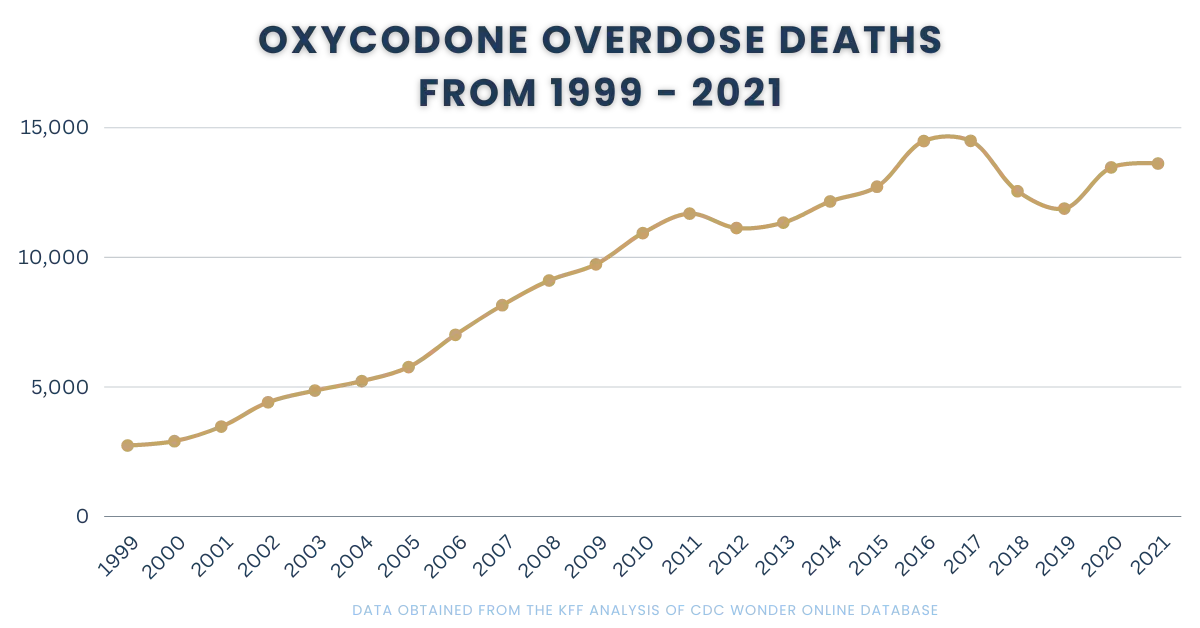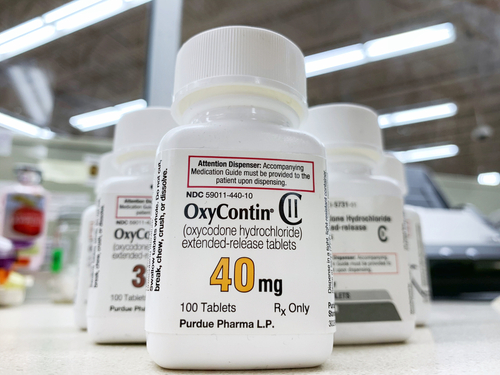Oxycodone, a potent opioid prescription painkiller, is a subject of concern regarding addiction. While its ability to alleviate pain and provide relief for individuals, it also possesses the potential for abuse and dependency. Oxycodone addiction can be a dangerous path, so recognizing the signs and symptoms can be crucial for early intervention and recovery. By understanding these risks, we can answer the question: Is oxycodone addictive?
In this article, we will discuss if oxycodone is addictive by exploring what oxycodone is, the side effects, signs an individual may be addicted to oxycodone, and treatment options for oxycodone addiction.
What is Oxycodone?
Oxycodone, also known by the brand name OxyContin, is a powerful opioid analgesic commonly prescribed for managing moderate to severe pain. It belongs to the opioid family, which acts on the central nervous system to alleviate pain. Oxycodone binds to the opioid receptors in the brain, spinal cord, and other body parts to reduce pain perception. Due to its high potential for abuse, it is classified as a Schedule II controlled substance, and it is crucial to use this medication under medical supervision. When used not under medical supervision or recreationally, oxycodone can carry many negative effects.
According to the National Institute on Drug Abuse (NIDA), 80,411 individuals died from an opioid overdose in 2021, with 13,620 individuals dying from a natural or semi-synthetic opioid overdose like oxycodone. This showcases the potential for oxycodone abuse and the dangers of becoming addicted to oxycodone. On top of the risk of oxycodone overdose, there are many other hazardous side effects that can come from misusing oxycodone.
Side Effects of Oxycodone
The side effects of oxycodone addiction can have negative outcomes for an individual in various areas of life. These effects can vary from individual to individual, as oxycodone can affect everyone differently. However, there are some common side effects to be aware of. These effects can include:
- Itching
- Constipation
- Hallucinations
- Drowsiness
- Nausea or vomiting
- Respiratory depression
- Dizziness
Common Forms of Oxycodone
There are many forms of oxycodone that have developed over the years. Oxycodone is currently available under various brand names, each with different combinations and formulations. Some of the most common forms of oxycodone, including their respective brand names, are as follows:
- OxyContin: OxyContin is an extended-release formulation of oxycodone and is the most common brand of oxycodone. It provides long-lasting pain relief and is designed to be taken every 12 hours. The tablet is formulated to release the medication slowly over time, maintaining a steady level of oxycodone in the bloodstream for continuous pain control. However, due to its higher concentration of oxycodone, OxyContin carries a higher risk of abuse and addiction than immediate-release formulations.
- Percocet: Percocet is a combination medication that contains oxycodone and acetaminophen. It is an effective option for managing moderate to moderately severe pain. Adding acetaminophen enhances the analgesic effect of oxycodone and can reduce the amount of opioids needed for pain relief.
- Percodan: Percodan is another combination drug, combining oxycodone with aspirin. Like Percocet, Percodan provides pain relief by synergizing the effects of both oxycodone and aspirin. Due to concerns over potential stomach irritation from aspirin, this formulation is less commonly prescribed nowadays.
Can You Be Addicted to Oxycodone?
Short answer: Yes, you can be addicted to oxycodone. As mentioned previously, oxycodone is a potent opioid with a high potential for addiction and abuse. Oxycodone can be an effective pain reliever. However, improper use can lead to psychological and physical dependence on the substance.
The risk of addiction increases when oxycodone is taken in higher doses or for longer durations than prescribed or when it is used without medical necessity. Individuals with a history of substance abuse, mental health disorders, or a family history of addiction may be more vulnerable to developing an addiction to oxycodone. Luckily, there are signs and symptoms of oxycodone addiction to look for.
Learn More: How Long Does It Take to Break an Addiction?
Signs You Might be Addicted to Oxycodone
Individuals can become addicted to oxycodone through various pathways, even when using it for legitimate medical purposes as prescribed by a doctor. However, when individuals decide to abuse oxycodone, they begin the downward spiral toward addiction. Luckily, there are some signs to recognize when you or a loved one has become addicted to oxycodone. These signs may include:
- Increased Tolerance: Over time, individuals may develop a tolerance to oxycodone, meaning they need higher doses to achieve the same pain relief or pleasurable effects. This can lead to escalating use and potential overdose risks.
- Neglecting Responsibilities: An individual struggling with a substance use disorder may neglect their responsibilities at work, school, or home due to their preoccupation with drug use.
- Doctor Shopping: Individuals with an addiction may visit multiple doctors or clinics to obtain multiple prescriptions for oxycodone without informing each healthcare provider about other prescriptions.
- Using Oxycodone despite Consequences: Despite experiencing negative effects on their health, relationships, or work, an addicted individual may continue using oxycodone.
- Increased Isolation: Individuals abusing oxycodone may isolate themselves from family and friends, preferring to be alone or avoiding social interactions.
- Unexplained Changes in Prescription Use: If an individual suddenly changes their oxycodone dosage or consumes it differently from their prescribed method (e.g., crushing or snorting the tablets), it may be a sign of abuse.
Oxycodone Withdrawal Symptoms
When an individual has become physically dependent on oxycodone or developed an addiction, abruptly reducing or stopping its use can lead to withdrawal. Oxycodone withdrawal symptoms can be challenging to endure and can vary in intensity depending on the level of dependence and the duration of drug use. The duration of withdrawal can vary, with symptoms gradually improving over a week or longer.
Some of the most common withdrawal symptoms may include:
- Nausea or vomiting
- Muscle pain
- Sweating or chills
- Anxiety
- Insomnia
- Increased heart rate
- Emotional instability
- Drug cravings
How Can You Treat Oxycodone Addiction?
Treating oxycodone addiction requires a comprehensive approach that addresses both the physical and psychological aspects of dependency. It is essential to seek professional help from healthcare professionals or addiction treatment centers who can tailor a treatment plan based on individual needs and circumstances. While treatment plans can vary between individuals, a typical treatment plan for oxycodone addiction may include:
- Medical Detoxification: For individuals physically dependent on oxycodone, medical detoxification is often the first step in treatment. During detox, the drug is gradually tapered under medical supervision to minimize withdrawal symptoms and safely manage the process. Medications like buprenorphine or methadone may be used to help ease withdrawal symptoms and cravings during detox.
- Behavioral Therapies: Behavioral therapies are a critical component of oxycodone addiction treatment. Therapies, like cognitive-behavioral therapy, help individuals identify and address behaviors and thought patterns that contribute to drug use, develop coping skills, and build motivation for recovery.
- Aftercare Support: Aftercare support is crucial for maintaining sobriety and preventing relapse once the treatment program is completed. Aftercare may involve ongoing therapy, support group attendance, or other resources to continue providing guidance and encouragement.
Read More: Opioid Addiction Treatment in Massachusetts
How Can You Prevent an Oxycodone Addiction?
Preventing an oxycodone addiction involves a combination of measures focused on patient education and medication adherence to prescribed guidelines. When individuals utilize strategies to prevent drug abuse, they set themselves up for success and avoid the consequences of drug addiction. Many prevention strategies may be used to help individuals. However, it’s crucial to find the best solution for your circumstances. Some of the most common prevention strategies may include:
- Patient Education: Healthcare providers should thoroughly educate individuals about oxycodone, its potential risks, and how to use it safely. Individuals should understand the importance of taking the medication exactly as prescribed and not altering the dosage without medical guidance. This helps to prevent individuals from misusing the drug in a way that may lead to addiction.
- Medication Adherence to Prescription: Individuals should adhere strictly to their prescribed oxycodone regimen. They should take the medication at the prescribed dosage and intervals, avoiding any deviation from the doctor’s instructions. The doctor may also utilize a medication monitoring program to ensure the individual takes the prescription correctly.
- Monitoring and Regular Check-ups: Healthcare providers should regularly monitor individuals on oxycodone to assess their pain levels, treatment response, and potential signs of misuse or dependence. Regular check-ups provide an opportunity to discuss pain management strategies and address concerns.
- Patient Support and Resources: Individuals should be encouraged to seek support from family, friends, or support groups during their pain management journey. Supportive environments can help patients cope with pain without solely relying on opioids.
Opioid Addiction Treatment at East Coast Recovery Center
If an individual struggles with oxycodone use, they may be experiencing an opioid use disorder or opioid addiction. This type of addiction can severely affect various aspects of life, causing life-threatening health conditions and problems with relationships with others.
At East Coast Recovery Center, we offer holistic addiction treatment and mental health care to those struggling with substance use disorders or mental health issues. Our treatment center provides specialized opioid addiction treatment to give our clients the necessary tools and support to overcome the addiction. We also offer individualized treatment programs for other addictions, such as alcohol addiction, marijuana addiction, or cocaine addiction.
If you or a loved one are struggling with substance abuse, contact our team of specialists to learn more about our programs today.














